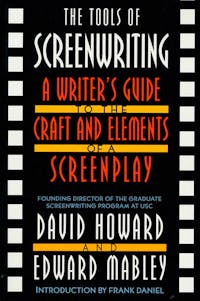The Tools of Screenwriting
A Writer's Guide to the Craft and Elements of a Screenplay
 Download image
Download image
ISBN10: 0312119089
ISBN13: 9780312119089
Trade Paperback
320 Pages
$19.99
CA$26.99
In The Tools of Screenwriting, David Howard and Edward Mabley illuminate the essential elements of cinematic storytelling, and reveal the central principles that all good screenplays share. The authors address questions of dramatic structure, plot, dialogue, character development, setting, imagery, and other crucial topics as they apply to the special art of filmmaking.
Howard and Mabley also demonstrate how, on a practical level, the tools of screenwriting work in sixteen notable films, including Citizen Cane, E.T., One Flew Over the Cuckoo's Nest, Rashomon, The Godfather, North by Northwest, Chinatown, and sex, lies, and videotape.
Reviews
Praise for The Tools of Screenwriting
"David Howard calls this book 'a writer's guide.' I think it's a wonderful and indispensable producer's guide to story, storytelling, and screenwriting."—Lawrence Turman, producer of The Graduate, Running Scared, The Flim-Flam Man, and other films
"What David Howard has done with The Tools of Screenwriting is to reveal for me and for all readers just how stories work; he shows that there are no absolute rules, but there are principles that can help a beginning writer gain understanding of all the elements that go into the creation of a 'good story well told.'"—Diane Keaton
"The Tools of Screenwriting is the best primer on the craft, far better than the usual paint-by-the-numbers sort of books that abound."—Frank Pierson, Academy Award-winning screenwriter of Cool Hand Luke, Dog Day Afternoon, Presumed Innocent, and A Star is Born
"As my screenwriting teacher, David Howard made the underlying principles of screenwriting clear, accessible, and useful. the same can be said of his succinct and elegant book, which I've already used as a much needed refresher course. It's sitting next to my computer now, right next to the thesaurus."—Amanda Silver, author of the screenplay of The Hand that Rocked the Cradle
"David Howard and Edward Mabley's The Tools of Screenwriting is a practical, comprehensive guide for writers at all levels. If I had this book four years ago, I wouldn't be paying off film school tuition today."—Adam Belanoff, Staff Writer, Wings and Murphy Brown
"The Tools of Screenwriting tosses aside ponderous paradigms and takes you directly to the heart of good writing. I hope every aspiring screenwriter reads it."—John Furia, Jr., Past President and Chairman of the Writer's Guild of America, West
"This is not simply a book about making bucks with your screenplays . . . The authors show an important connection between learning to screenwrite and examining the elements of theater."—Film Threat
"Howard and Mabley clearly define the building blocks of storytelling."—Booklist
"An excellent volume for the student of screenwriting at almost any level. Recommended."—Classic Images


